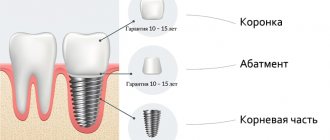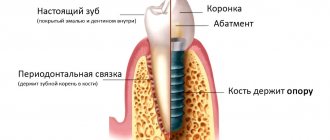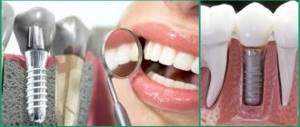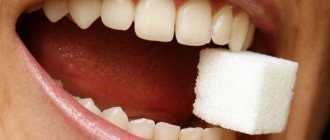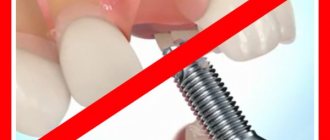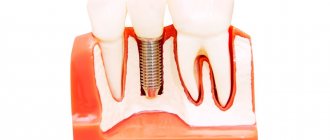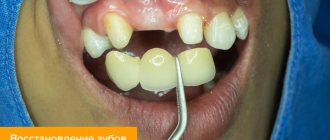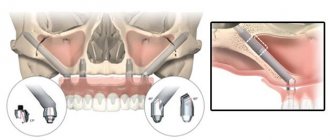Intramucosal implantation
A type of implantation that involves the installation of mini-implants and is used to obtain extremely strong fixation of removable dentures.
Removable dentures are the most inexpensive type of orthopedic structures, which have a number of disadvantages, including the inability to firmly fix the product in the oral cavity. Especially if removable prosthetics are performed in the upper jaw. Such a prosthesis can easily fall out when eating or talking, and of course this will not bring any pleasant emotions to the person. And what is important: this problem is not solved by gels, which are so widely advertised on TV. Intramucosal implantation or mini-implantation allows you to qualitatively solve the problem of fixing removable dentures, improve the aesthetics of the result of prosthetics, and relieve the patient of problems such as rubbing soft tissues with the denture or impaired diction.
Typically, this type of technology is used when there are contraindications to intraosseous implantation, and if the patient wishes to minimize his costs for dental restoration.
During the operation, special implants consisting of two parts are used. The first part of the system is fixed on a removable denture, the second is implanted into the mucous membrane. Implants of the intramucosal type are installed in holes that the implantologist forms with a bur in the gums. After the implants are implanted, a prosthesis is immediately placed on them, which is easily removed. This makes it possible to carry out high-quality oral hygiene.
USEFUL FACT: Intramucosal implantation can only be carried out if the mucosa is in good condition, namely, if its thickness is at least 2.2 millimeters.
Transosseous implantation
Another type of implantation that modern implantologists have abandoned.
This technology was used for severe bone resorption in the area of the alveolar process and for implantation in the lower jaw. If the diagnosis revealed a similar condition of the bone tissue, implantation could only be carried out using a transosseous method or after an operation to move the nerve located in the lower part of the tooth socket. But such an operation implied additional costs for the patient and not everyone agreed to it, so the doctors offered an alternative - transosseous implantation. The operation used implants of a specific type - in the form of a curved bracket with two pins, which were implanted not in the oral cavity, but in the chin area. Transosseous implantation is a complex technology and a traumatic operation; in addition, this method does not eliminate certain requirements for bone tissue. This type of implantation could not be used if the bone was below 6 millimeters and thinner than 3 millimeters.
Laser dental implantation
Laser implantation is not a separate type of implantation; this is how clinics refer to an operation during which all the incisions necessary for implantation will be made not with a scalpel, but with a laser.
This method of carrying out the operation has its advantages, including:
- Reducing the time required for surgical intervention;
- Reducing the pain of the procedure for the patient and, accordingly, reducing the dose of anesthetic drugs;
- Low traumatism, antibacterial action of the laser;
- There are no stitches, which has a positive effect on tissue recovery time.
There is essentially one downside to the laser type of dental implantation: the high price, which is much higher than the cost of traditional surgery. For comparison, turnkey implantation using a standard set of manipulations and a scalpel can cost from 35,000 rubles, the same operation, with the same implants and procedures, but with a laser - from 60,000 rubles.
USEFUL FACT: Many implantologists do not believe that laser dental implantation provides patients with any significant benefits. The implant healing period remains the same, but the patient’s costs increase significantly.
Express dental implantation
It is also not a separate type of implantation.
For the sake of beautiful advertising, clinics use the sonorous name “express implantation” to designate one-stage implantation, in which the installation of implants and a prosthesis is carried out in one operation. But the advertisement is silent about one very important detail regarding this type of implantation: it can be performed only in cases where the patient has no contraindications to surgery, there is no bone tissue atrophy, and there is enough space in the oral cavity for implantation. That is, if there are initially ideal conditions for implantation.
However, if such conditions exist, then the patient can receive a number of benefits from the use of one-stage implantation:
- Teeth can be restored in the shortest possible time and thus relieve a person from psychological discomfort and the need to limit oneself in the diet.
- One-stage implantation can be carried out in case of diabetes, hepatitis, periodontitis - conditions that are contraindications for other types of implantation.
- The patient's expenses for dental restoration are reduced, since preliminary osteoplasty is not required and, moreover, this implantation technology makes it possible to restore any number of teeth using a minimum of implants (for example, you can restore a full row of teeth with just 4 or 6 implants).
- There is no need to pay for an abutment and gum former, since implants used with one-stage technology are monolithic structures.
You can find out more useful details on one-stage implantation at an appointment with the implantologists of the Firadent clinic, which offers premium services in the field of dentistry!
Navigation implantation
Does not apply to certain types of implantation. This term refers to the use of a special program that allows you to plan in detail the operation to install implants and develop surgical templates for it. The use of templates eliminates inaccuracies when installing implants into the bone and reduces the traumatic nature of the operation. The navigation implantation service is offered to all patients of our premium dentistry in Moscow - Firadent.
Implantation without surgery
Implantation without surgery - this type of technique does not exist. This name is used for advertising and to attract clients and implies the operation is performed in a low-traumatic way, which does not exclude surgical intervention. Yes, the implantologist will not cut the patient’s gums, but to form a bone bed for the implant, he will make holes in the jaw bone with drills.
Types of implantation in complete absence of teeth
In case of complete absence of teeth, one-stage implantation using All-on-4 or All-on-6 technology is used.
These technologies make it possible to completely restore the dentition and use a limited number of implants - 4 or 6. The implants are installed in the jaw according to a certain pattern and then, immediately after the operation, a temporary prosthesis is fixed on them, which, after engraftment of the titanium rods, is replaced with a permanent orthopedic structure.
All-on-4 and All-on-6 have many advantages: these technologies make it possible to quickly restore the dentition, reduce the overall treatment time and costs for the patient, and in addition, they allow you to do without bone grafting even with diagnosed bone tissue atrophy. All-on-4 or All-on-6 are used in cases of complete edentia or when teeth are preserved in the dentition, but their treatment with conservative methods will not be effective and will not provide the opportunity to obtain a solid base for a classic prosthesis.
Are dental implants harmful?
After tooth extraction, bone loss begins within six months. In the absence of constant pressure (load), it resolves. Experts agree - the implant is considered the only structure that can evenly load the tissue. Wearing removable dentures and bridges does not stop the process.
Dental implants restore the jaw system by replacing the top and root of the tooth. The structures promote proper nutrition of bone tissue cells, which adapt to constant loads. If the effect on the bone is not enough, the tissue weakens, dissolves, and decreases in size. The higher the load, the denser and larger the bone mass. Therefore, when implants are installed, it increases.
Implants are made from bioinert materials that are safe for the body and therefore do not cause any harm. And due to the ability to restore bone tissue, they bring only benefits.
Patient reviews
During pregnancy, a tooth became inflamed and had to be removed. There was an ugly hole left. My husband suggested getting an implant, I agreed. After the procedure, slight swelling appeared, which went away after a while. I chose dentures with a lifetime guarantee and have no regrets.
Julianna
I hesitated between a bridge and an implant, and ultimately chose the latter option. There are many varieties available now. After choosing for a long time, I decided to settle on a domestic manufacturer. Overall, I was satisfied with the result. The dentist assured that this solution is no worse than its foreign counterpart, and I completely agree with him.
Anatoly
The doctor advised me to think about implantation, and after studying all the pros and cons, I decided in favor of Swiss prostheses.
Fortunately, I did not have any contraindications to the installation. Now I'm happy with how the design has taken root. I am completely satisfied with the implant, and I am pleased with the aesthetic appeal. Tatiana
Pros of implantation
Recreating a tooth in its natural form
Metal-free ceramic crowns, which are made individually, are installed on the implant. They cannot be distinguished from natural teeth by color or shape. Traditional dentures, due to their design, are visible when a person talks or smiles. For the smile area, implantation is the best choice.
Preventing bone atrophy
The design of the implant is close to the shape of a real tooth - it has a root that prevents the tissue from losing volume. The implant provides chewing pressure from the inside, just like a natural tooth, so the jawbone does not lose load and does not atrophy.
Maintaining gum shape
It is important not only to choose a crown and make it look like a natural tooth, you also need to take care of the shape of the gums. During implantation, before prosthetics, a former is installed for two weeks, which creates an even gingival contour and preserves the aesthetics of the gums. Bridges and clasp prostheses do not allow you to recreate the natural appearance of soft tissues.
No food restrictions
The implant is no different from a real tooth, completely restores chewing function, and you can eat any food with it. With standard dentures, tough meat is too tough. In addition, when installing a bridge or clasp prosthesis, the load is transferred to the supporting units of the dentition, increasing the pressure on them.
Implantation does not require treatment of healthy teeth
To install a standard bridge, the units adjacent to the defect, even healthy ones, are depulped and ground down. This is necessary to avoid inflammation of the supporting teeth. If inflammatory processes occur under the prosthesis, you will have to remove the orthopedic structure, re-treat the supports, and re-fix the prosthesis. This is not required for implantation.
Unlimited service life
A high-quality implant lasts a lifetime. At our Center we provide a lifetime guarantee on implantation. The crown will have to be changed, but not more often than once every 10 years. Other prostheses are updated more frequently. Bridge and clasp - once every 5-8 years, each time grinding down healthy teeth. Removable - every year, since with bone tissue atrophy the shape of the jaw changes, the prosthesis needs to be “adjusted” each time.
Restoring and maintaining a healthy smile
Orthopedic structures installed in support of natural teeth gradually destroy them. Restored 1 unit destroys 2 adjacent ones. This leads to edentulism and a removable jaw. The advantage of implantation is that a lost tooth is restored without negatively affecting neighboring units, keeping the smile healthy and beautiful.
Easy to care for
Implants do not require complex care. They are cleaned in the usual way, and they are not susceptible to caries or other diseases. You need to pay attention to the necks of artificial roots - use an irrigator.
Natural sensations
Implants do not feel like foreign bodies in the mouth and do not cause discomfort or problems when chewing. Food particles do not get clogged under them, which with standard dentures leads to the growth of bacteria and inflammation.
Comparison of dental implantation and bridge prosthetics techniques
Are the savings justified?
Speaking about different types of dental implants, their pros and cons
, the issue of price could not be avoided. Unfortunately, traditional prosthetics are cheaper than implantation, so patients often prefer the first option. Sometimes the reason is fear of a new unfamiliar procedure, as well as contraindications to it.
Before choosing traditional dentures, consider the following points:
- To install dentures, grinding and depulping of adjacent teeth are required. In the future, the prosthesis will need to be reinstalled due to the destruction of adjacent teeth. This process is inevitable.
- A removable denture does not prevent bone loss. Therefore, your facial features will change over time.
- Even fixed dentures do not prevent the development of caries. In this case, it is necessary to remove them in order to cure the disease.
- People who use dentures will confirm that they experience pain while chewing food.
Contraindications to dental implantation become a disadvantage for those people who have them. But at the same time, the ban is also imposed on people who suffer from severe forms of diseases of the cardiovascular and circulatory systems and connective tissue. It covers those patients who have advanced liver and thyroid diseases. Unfortunately, allergies to antibacterial drugs and painkillers also do not allow for full implantation.
There are local contraindications:
- inflammatory diseases of the oral cavity;
- unsatisfactory condition of the oral cavity due to insufficient hygiene.
In the first case, the doctor treats foci of inflammation. In the second case, the dentist conducts an explanatory conversation with the patient. If he flatly refuses to change his habits, he is informed that implantation is impossible.
Taking bisphosphonates is another contraindication. The drugs affect bone structure. If you have a metal allergy, you should tell your doctor. The structure that will be installed in the future will first be sent for a special examination. It will reveal the percentage of metal alloys.
Minuses
Contraindications
Implantation, like any other surgical operation, has limitations:
- diseases of the heart, endocrine system;
- oncology;
- mental disorders;
- allergic reactions to medications;
- multiple inflammations in the oral cavity.
But the listed diseases in remission are considered relative prohibitions, not absolute.
High price
The relatively high cost is an obvious disadvantage. In our Center, the price for a set of procedures for installing 1 implant is from 60,000 rubles . For comparison, a removable denture for 2 jaws costs 36,000 rubles. But the implant is installed for life, and the prostheses are constantly changed. Costs are recovered in the long term.
Surgical intervention
Implantation requires surgery, which not all patients are ready for. In our Center, the problem is solved with anesthesia, which relieves the patient’s discomfort. If a person is very nervous or afraid, we use sedation - implantation during sleep.
Make an appointment with an implantologist
Implantation area
How can a patient understand that the implantation went well or complications have begun? The condition is normal when swelling appears after surgery and increases within three hours. After seven to ten days, the swelling subsides. If during this period the swelling does not go away, but increases even more, hyperemia of the skin and purulent discharge appear, then you need to consult a doctor.
The implant may fail several years after the process. Causes:
- patient's health status;
- improper care;
- incorrect installation;
- bad habits;
- doctor errors during surgery.
For the lower jaw, the survival stage is shorter. During the passive implantation process, you need to follow several tips:
- observe the rules of hygiene;
- periodically consult a surgeon;
- carry out antiseptic treatment of tissues;
- take anti-inflammatory drugs;
- follow a diet.
The sutures are removed after 5-7 days, when severe swelling and pain subsides, a temporary prosthesis is put on to reduce the patient’s discomfort. If everything went well, then after 3 - 5 months the pain, bad breath, bleeding gums and discomfort will go away.
In what cases is implantation performed?
Implantation is indicated for the restoration of any number of teeth; traditional prosthetics is limited.
Indications for implant installation:
- The absence of one tooth concerns the front, chewing tooth on the lower or upper jaw.
- Included defect is the loss of several teeth with single or long intervals in any part of the dentition.
- End defect - removal of the outer teeth on one or both sides of the jaw.
- Complete edentia is the loss of the entire dentition on the jaw.
Advantages and disadvantages of implant installation methods
Implantologists use three protocols, which differ in terms of recovery time and method of installation of the structure. Each has its own advantages and disadvantages.
Classical
It is carried out in two stages. First, an artificial root is installed using a patchwork method with the gums peeled off to gain access to the bone tissue. 2-4 months after engraftment, the crown is fixed. A sufficient volume of bone is required for the procedure, so if there is a deficiency, a build-up is carried out first, which increases the period of tooth restoration.
pros
- the most reliable method
- implants take root without stress - there is no risk of displacement
- formation of the gingival contour before prosthetics
Minuses
- long-term treatment
- the need for bone grafting for atrophy
One-stage
It is carried out in one stage - there is no need to wait for the artificial root to engraft. The implant is installed through a mini-tissue puncture and loaded with a crown immediately after installation. But the protocol is only suitable if there is sufficient volume and density of bone tissue.
pros
- low trauma - no gum incision required
- quick recovery—the crown is fixed for a maximum of 3 days
Minuses
- risk of implant displacement under increased loads
- The doctor does not have access to bone tissue to allow immediate growth when installing an implant
One-step
Provides for the removal of a natural root and the installation of an artificial root in one operation. In some cases, it is possible to install a crown immediately.
pros
- treatment time is reduced - no need to wait for tissue healing
- no need to re-access the bone to place the implant
Minuses
- In case of anatomical deficiency of bone tissue, implantation without osteoplasty is not performed
More information about implantation protocols:
- Classical
- One-stage
- Simultaneous immediately with tooth extraction
Negative sides
Let’s continue listing the pros and cons of dental implantation. Reviews
They can tell you a lot, but no matter how perfect the technique is, there will definitely be at least one dissatisfied patient.
During implantation, the doctor uses a biologically inert material - titanium. It has unique properties and ensures maximum survival of bone tissue. But despite this, allergies to titanium still occur, although rarely. This indicates the individual characteristics of the body, and not the poor work of the doctor. The qualifications of a dentist are certainly important. But no doctor can give a 100% guarantee.
If you meet a highly qualified implantologist, he will pay maximum attention to the condition of your body, the presence of concomitant diseases and other factors that can affect the success of the operation. With a high probability, the manipulation performed by such a doctor will result in implant engraftment and restoration of chewing and aesthetic functions. By the way, patients who are not suitable for titanium do not have to refuse implantation. They are offered an alternative option - zirconium oxide.
Implantation means surgery. This means that some painful sensations cannot be avoided. This applies not only to the moment of implantation, but also to the recovery period. But compared to other types of prosthetics, the morbidity here is much lower.
There are a number of contraindications for implantation. Your dentist will tell you about them.
Doctors unanimously say that after losing a tooth, you should not hesitate to restore it. Implantation can take place quickly and with minimal discomfort for the person. If it has been inactive for a long time, you will have to use sinus lift technology. This is bone tissue building. Under certain circumstances, it can cause discomfort to the patient.
Speaking about the price of implantation, in comparison with conventional prosthetics, it is more expensive.
